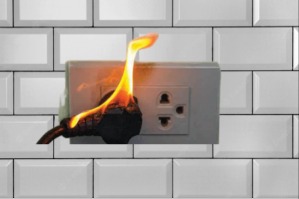
As an electricity user, I know you have been witnessing an electrical short circuit. But did you know it can pose a serious risk in your home if unchecked?
This article we will explore exactly what an electrical short circuit is, the various causes and how to prevent it. Read on for the full details.
What is an electrical short circuit?
An electrical short circuit occurs when a live or hot wire comes in contact with the neutral either by touching, or arcing. Causing the current to leave the intended path and take the shorter route to the ground.
Short circuits are dangerous and can cause severe hazards such as electrical shock, damage to appliances, electrical fires, etc.
Types of short circuits
There are two main types of short circuits, that include:
- Normal short circuits
- Ground fault short circuits.
Normal short circuits
A normal short circuit occurs when a hot live wire comes in contact with the neutral wire. This brings down the resistance, causing huge currents to flow through an unintended path.
Ground fault short circuits
This occurs when a hot wire touches the grounded part of a metal box, bare ground wire, outlets, etc.
What causes short circuits?
There are several factors that can cause a short circuit, these include
- Loose connections in the metal box
- Pests chewing down the wires
- Damaged appliances, outlets, switches, lights and other electrical devices
- Water coming into contact with electrical wires
- Damaged wire insulators
- Build-up or electrical surge
- Screws and nails piercing through walls and coming into contact with live wires.
Signs of a short circuit
The most common signs that have an electrical short circuit are:
Tripped circuit breaker or blown fuse
A tripped breaker or blown fuse is one of the common signs of a short circuit. A circuit breaker or fuse is built to withstand certain amps of current.
When a short circuit occurs, high currents above rated are pushed to the breaker, making it to trip off.
Burn mark or burning smell
If you notice a burnt mark on your wires, or detect a burning smell near outlets or electrical appliances, there might be a short circuit present.
Flickering or dimming lights
When lights flicker or dim for no obvious reason, it might be a sign of a short circuit.
Hot outlets and switches
If your outlets or switches are hot to touch, it could be a sign of a short circuit causing excessive heat-up.
Effects of short circuits
Short circuits can have various effects on our homes and appliances, and they include:
Overheating
When a short circuit occurs, the amount of electrical currents flowing through the circuit increases, causing the wires and other components of the circuit to overheat. This can cause electric fires or damage to the wire insulation.
Damage to electrical equipment
When high voltage flows through electrical equipment, such as transformers, motors, and generators, it can cause the equipment to fail.
Explosions
Sometimes, short circuits cause explosions. This is more common in industries where there are large amounts of flammable materials present.
Power outages
Short circuits can also cause power outages when they trip circuit breakers, or damage electrical wires.
Electric shock
Short circuits can also cause electrocution or serious injury when it follows an unintended path.
How to prevent Electrical short circuits
To prevent short circuit problems, you must follow the proper wiring and installation practices. Here are some tips to put you through.
Hire a qualified electrician
A qualified electrician will have the knowledge and expertise to handle electrical installations such as wire sizing, NEC Code, outlet and switch wiring, taping the wires to avoid exposure, and others.
Avoid circuit overload
Overloading a circuit can put more pressure on the wires, leading to overheat, wire burn and short circuits.
Be mindful of the load you put on each electrical circuit and make sure it doesn’t exceed the amperage rating.
Monitor your appliances and outlets
Ensure that your appliances, outlets and switches are OK. Faulty appliances can draw more current than rated, leading to short circuits.
Monitor your wires, extension cords and outlets to make sure they are OK. Look out for burnt marks burning smell, and sparks emitting from the outlets and fix it immediately.
Reduce the use of electricity during thunderstorms
Lightning strikes can cause dangerous short circuits because of the amount of electricity they carry. Reduce the use of electricity during storms for safety reasons.
Install protective devices
Install circuit breakers, fuses, arc-fault circuit interrupters (AFCIs), and ground fault circuit interrupters (GFCIs) to guard against short circuits.
These devices interrupt the flow of faulty currents thus reducing electrical hazards.
Perform regular inspection
Get a licensed electrical inspector to check your wiring system at least once a year. He will identify critical issues and resolve them before they get worse.
Use quality materials: Use high-quality electrical materials that meet industry standards, so it can reduce malfunctioning and defects which cause short circuits.
Conclusion
Electrical short circuits are dangerous however, we can prevent them. Follow proper wiring practices, conduct regular maintenance, use protective devices and address any issues on time to ensure a safe electrical system.
Related articles